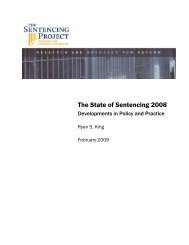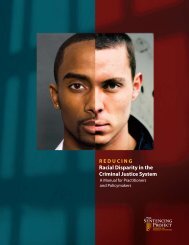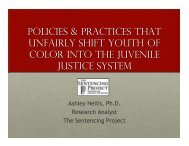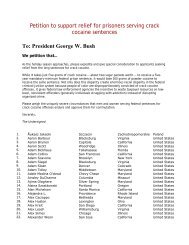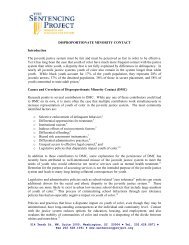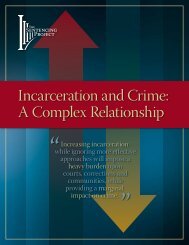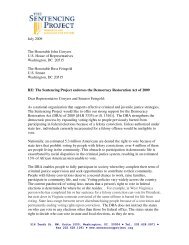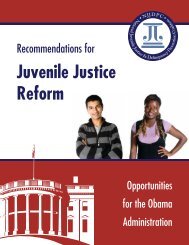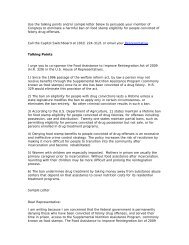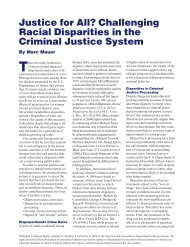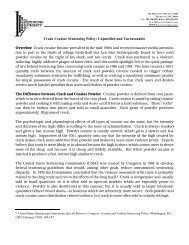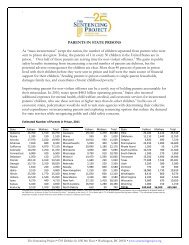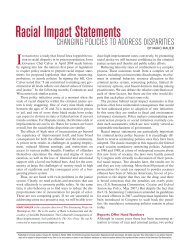ANNUAL REPORT 2011 - The Sentencing Project
ANNUAL REPORT 2011 - The Sentencing Project
ANNUAL REPORT 2011 - The Sentencing Project
You also want an ePaper? Increase the reach of your titles
YUMPU automatically turns print PDFs into web optimized ePapers that Google loves.
<strong>ANNUAL</strong> <strong>REPORT</strong> <strong>2011</strong>
For further information:<br />
<strong>The</strong> <strong>Sentencing</strong> <strong>Project</strong><br />
1705 DeSales St. NW<br />
8 th Floor<br />
Washington, D.C. 20036<br />
(202) 628-0871<br />
<strong>The</strong> <strong>Sentencing</strong> <strong>Project</strong> is a national non-profit organization<br />
engaged in research and advocacy on criminal justice issues.<br />
<strong>The</strong> banner image on page 4 is a photograph of Richard X. Thripp.<br />
His other work can be found at http://thripp.com.<br />
Copyright @ 2012 by <strong>The</strong> <strong>Sentencing</strong> <strong>Project</strong>. Reproduction of this<br />
document in full or in part, and in print or electronic format, only<br />
by permission of <strong>The</strong> <strong>Sentencing</strong> <strong>Project</strong>.<br />
www.sentencingproject.org
Dear Friends,<br />
In <strong>2011</strong>, <strong>The</strong> <strong>Sentencing</strong> <strong>Project</strong> celebrated its 25th anniversary with a forum held at the National Press<br />
Club in Washington, D.C. That event was designed with two ideas in mind. First, to celebrate the<br />
accomplishments of our organization over a quarter century, of which we are indeed proud. Our<br />
contributions to public debate and public policy on issues of crime and punishment during the period<br />
have helped to reduce harm and improve lives.<br />
Secondly, and more importantly, we used the occasion to envision what our criminal justice system—<br />
and our approach to public safety—should look like 25 years into the future. We did so because we<br />
believe there is a moment of opportunity now, and therefore it is timely to think broadly about<br />
directions for constructive reform.<br />
In order to envision the future, it is helpful to assess where we have come from over the past quartercentury.<br />
In this regard, there are two very different stories we might tell.<br />
<strong>The</strong> first is one of a policy climate in which punishment has been exalted in ways unimaginable not<br />
very long ago. <strong>The</strong> number of people in our prisons and jails has nearly tripled during this time, a half<br />
million people are incarcerated for a drug offense, and racial/ethnic disparities within the justice<br />
system are profound. Increasingly, we are gaining new insight into the varied ways in which high rates<br />
of incarceration in disadvantaged communities affect family formation, social cohesion, and life<br />
prospects.<br />
<strong>The</strong> other story of the past 25 years is a more hopeful one. That analysis focuses on the steep drop in<br />
crime in recent years, the broad acceptance of the need for services for people returning to the<br />
community from incarceration, and a focus on reducing corrections spending and reinvesting the<br />
savings in strategies that can decrease crime and strengthen neighborhoods. We also appear to be at a<br />
point where prison populations are finally stabilizing (though still at world record levels) after several<br />
decades, and are even declining substantially in a handful of states.<br />
Both of these views are factually correct, which suggests that it is up to us to determine in which<br />
direction criminal justice policy will proceed. Both for reasons of effectiveness and compassion, we<br />
hope that the nation will adopt the strategy that emphasizes opportunity rather than punishment as<br />
the guiding theme of our vision for public safety. This annual report highlights what we have done in<br />
<strong>2011</strong> to move farther down that path.<br />
Marc Mauer<br />
Executive Director<br />
<strong>The</strong> <strong>Sentencing</strong> <strong>Project</strong><br />
P.S. In a recent poll conducted for Guidestar of leaders across the criminal justice field, <strong>The</strong> <strong>Sentencing</strong><br />
<strong>Project</strong> was ranked among the top 3 nonprofit organizations for its impact.<br />
<strong>2011</strong> <strong>ANNUAL</strong> <strong>REPORT</strong> | 1
RESEARCH<br />
THAT POLICYMAKERS TRUST<br />
Advancing Juvenile Justice<br />
First National Survey of Juvenile Lifers. Following<br />
the U.S. Supreme Court’s declaration in 2010<br />
that the practice of sentencing juveniles to life<br />
without parole for non-homicide offenses is<br />
unconstitutional, <strong>The</strong> <strong>Sentencing</strong> <strong>Project</strong> began<br />
an in-depth national examination of the 2,500<br />
individuals in the U.S. serving sentences of<br />
juvenile life without parole. We administered a<br />
mailed survey to these individuals and<br />
achieved nearly a 70% response rate. <strong>The</strong><br />
survey—the first of its kind—is collecting<br />
information on the conviction offense, race and<br />
geographic location of the individuals and<br />
demographic information such as educational<br />
attainment, exposure to violence, and access to<br />
preventive services prior to incarceration. <strong>The</strong><br />
results of the study will be published early in<br />
2012.<br />
Eliminating Racial Disparities<br />
Advocacy for Racial Justice: Prospects for Criminal<br />
Justice Reform, an essay by Marc Mauer, argues<br />
that we not avoid talking about racial justice,<br />
but do so in a way that addresses public safety<br />
concerns. Successful efforts to persuade states<br />
to adopt racial impact statements as legislative<br />
policy, promote crack cocaine sentencing<br />
reform, and return the right to vote to people<br />
with felony convictions have built heavily on<br />
explicit arguments about racial fairness. <strong>The</strong>se<br />
campaigns were also successful because they<br />
rested on years of advocacy to demonstrate the<br />
enormity and impact of racial disparities<br />
throughout the justice system. <strong>The</strong> article was<br />
published by <strong>The</strong> Aspen Institute as a chapter<br />
in Race, Crime and Punishment, a volume of<br />
essays by scholars, activists and professionals<br />
working in the criminal justice field.<br />
Addressing Racial Disparities in Incarceration, an<br />
article by Marc Mauer published in a special<br />
issue of <strong>The</strong> Prison Journal focused on policy<br />
reform, reviews the current trends and impact<br />
of mass incarceration on communities of color,<br />
with a focus on criminal justice policy and<br />
<strong>2011</strong> <strong>ANNUAL</strong> <strong>REPORT</strong> | 2
practices that contribute to racial disparity. It<br />
also examines the impact of disproportionate<br />
incarceration rates on public safety, offenders,<br />
and the communities in which they live. <strong>The</strong><br />
article concludes with recommendations for<br />
policy reforms to promote racial justice.<br />
Making the Case for <strong>Sentencing</strong><br />
Reform<br />
<strong>The</strong> State of <strong>Sentencing</strong> 2010, a report authored by<br />
Nicole Porter, argues that overcrowded prisons<br />
and budget deficits have proved to be a potent<br />
force for prison and sentencing reform across<br />
the nation. It notes that 23 states and the<br />
District of Columbia adopted new criminal<br />
justice policies in 2010—ranging from scaling<br />
back mandatory sentencing laws to reforming<br />
crack and powder cocaine sentencing<br />
disparities to improving parole supervision --<br />
all aimed at reducing prison populations and<br />
facilitating successful reentry from prison<br />
without compromising public safety.<br />
Breakthrough in U.S. Drug <strong>Sentencing</strong> Reform: <strong>The</strong><br />
Fair <strong>Sentencing</strong> Act and the Unfinished Reform<br />
Agenda is an analysis by Kara Gotsch of the 2010<br />
crack cocaine sentencing reform and the<br />
factors that contributed to the law’s<br />
overwhelming bipartisan support. <strong>The</strong> essay<br />
argues that a more profound shift in the<br />
nation’s approach to drugs will require<br />
sustained funding for evidence-based<br />
prevention and treatment; mainstreaming<br />
harm reduction interventions such as needleexchange<br />
programs; and re-investing in the<br />
communities that have been hardest hit by<br />
drug abuse and by the drug war. <strong>The</strong> article was<br />
first published by the Washington Office on<br />
Latin America and subsequently reprinted by<br />
the American Constitution Society.<br />
Bipartisan Justice, an article by Kara Gotsch that<br />
reviews the recent history of national criminal<br />
justice policymaking, concludes that any<br />
movement to advance justice reform must<br />
incorporate a bipartisan strategy. Using the<br />
Fair <strong>Sentencing</strong> Act of 2010 as an example, the<br />
article details how successful legislative<br />
strategies for sentencing reform rest on<br />
coalitions that are diverse and include all<br />
stakeholders, including criminal justice reform<br />
organizations, corrections agencies,<br />
progressive and conservative faith groups, and<br />
law enforcement. <strong>The</strong> article was published in a<br />
special edition of <strong>The</strong> American Prospect<br />
magazine devoted to mass incarceration.<br />
<strong>Sentencing</strong> Reform, Amid Mass Incarcerations,<br />
Guarded Optimism. Published in the Criminal<br />
Justice Magazine of the American Bar<br />
Association, this overview of the sentencing<br />
reform movement of recent years by Marc<br />
Mauer assesses the range of policy changes at<br />
both the state and federal levels, along with an<br />
analysis of the obstacles and challenges to more<br />
substantial reform moving forward.<br />
<strong>2011</strong> <strong>ANNUAL</strong> <strong>REPORT</strong> | 3
ADVOCACY<br />
FOR CHANGE AT STATE AND<br />
FEDERAL LEVELS<br />
Strengthening Local Advocates<br />
Providing support to state-level advocates. Our<br />
technical assistance helped local advocates and<br />
policymakers to promote reform in their states,<br />
including:<br />
California – coordinated national<br />
organizational support of measures to<br />
eliminate juvenile life without parole and to<br />
promote alternatives to incarceration at the<br />
county level.<br />
Connecticut – developed media materials to<br />
advocate for reducing the use of sentencing<br />
enhancements for certain drug offenses.<br />
Maryland – provided testimony to the<br />
Maryland Senate on ways to reduce the state’s<br />
reliance on incarceration, focusing particularly<br />
on approaches to reducing parole revocations.<br />
Missouri – worked to identify and bring<br />
together coalition partners to support crack<br />
cocaine reform efforts.<br />
Oklahoma – provided research and advocacy<br />
assistance for a campaign to eliminate life<br />
without parole as a sentencing option for<br />
certain offenses.<br />
Reducing the collateral consequences of<br />
incarceration. Bringing activists together on a<br />
regular basis by conference call, we continued<br />
to pay special attention to efforts to overturn<br />
the permanent prohibitions on the receipt of<br />
welfare benefits and food stamps for persons<br />
with a felony drug conviction. Though these<br />
are restrictions imposed by federal welfare<br />
reform legislation, states may opt out of its<br />
provisions, and many have done so.<br />
Providing Leadership at the<br />
Federal Level<br />
<strong>The</strong> “Webb Commission.”<br />
<strong>The</strong> <strong>Sentencing</strong> <strong>Project</strong><br />
continued to play a<br />
leading role in<br />
advocating for passage of<br />
the National Criminal<br />
Justice Commission Act.<br />
Re-introduced by Sen.<br />
Jim Webb (D-VA), this legislation would create<br />
a bipartisan Commission to review and identify<br />
effective criminal justice policies and make<br />
recommendations for reform.<br />
<strong>2011</strong> <strong>ANNUAL</strong> <strong>REPORT</strong> | 4
Reforming drug policy. We were in the forefront<br />
of those making the case to Congress and the<br />
U.S. <strong>Sentencing</strong> Commission that the<br />
sentencing guideline provisions of the Fair<br />
<strong>Sentencing</strong> Act of 2010 should be applied<br />
retroactively to prisoners who were<br />
incarcerated under the earlier, harsher 100 to 1<br />
crack cocaine sentencing disparity, and on two<br />
occasions Marc Mauer served as an invited<br />
witness before the U.S. <strong>Sentencing</strong> Commission.<br />
In June <strong>2011</strong>, the Commission agreed with the<br />
arguments in favor of retroactivity, which will<br />
result in 12,000 individuals sentenced before<br />
the law went into effect having their guideline<br />
sentences reduced by 3 years on average.<br />
Racial justice for young people. Our advocacy<br />
efforts were designed to build support for a<br />
more comprehensive approach to juvenile<br />
justice overall, with an emphasis on juvenile<br />
life without parole, disproportionate minority<br />
contact and prevention.<br />
Ashley Nellis served as<br />
Chair of the Youth<br />
Reentry Task Force and<br />
the Juvenile<br />
Accountability Block<br />
Grant Coalition and cochair<br />
of the National<br />
Juvenile Justice and<br />
Delinquency Prevention<br />
Coalition, which represents more than 80<br />
national groups, including faith-based,<br />
education and prevention-oriented law<br />
enforcement organizations.<br />
<strong>2011</strong> <strong>ANNUAL</strong> <strong>REPORT</strong> | 5
BUILDING<br />
PUBLIC SUPPORT FOR REFORM<br />
In the News<br />
Widespread coverage of critical issues. <strong>The</strong> <strong>Sentencing</strong> <strong>Project</strong>’s staff continued to serve regularly as a key<br />
resource for national and regional media, and received media inquiries on a daily basis for interviews,<br />
data analysis, story ideas, and op-eds. In <strong>2011</strong>, more than 70 national, regional and local newspapers,<br />
radio and TV stations, and prominent web sites cited <strong>The</strong> <strong>Sentencing</strong> <strong>Project</strong>’s publications or<br />
interviewed our staff, including the following:<br />
ABC News Radio<br />
Alternet<br />
Associated Press<br />
Arizona State University<br />
News<br />
Baltimore City Paper<br />
Between the Lines Radio<br />
Birmingham News<br />
BlackAmerica.com<br />
Boston Review<br />
California Watch<br />
CBC News<br />
CBC TV<br />
Change.org<br />
Chicago Tribune<br />
Clarion-Ledger<br />
Cleveland Plain Dealer<br />
CNN<br />
Crime Report<br />
Death and Taxes Magazine<br />
Des Moines Register<br />
Dothan Eagle<br />
Fairfax News<br />
Final Call<br />
First Perspective News<br />
Florida Independent<br />
Florida Times Union<br />
Houston Chronicle<br />
Huffington Post<br />
Indianapolis Star<br />
International Business Times<br />
Iowa Independent<br />
Issues in Higher Education<br />
Los Angeles Times<br />
Miami Herald<br />
Miller McCune<br />
MSNBC TV Morning Joe<br />
MSNBC TV- Rachel Maddow<br />
Nashua Telegraph<br />
National Catholic Reporter<br />
National Public Radio<br />
NBC Nightly News<br />
New Haven Register<br />
New York Daily News<br />
New York Times<br />
New Zealand Herald<br />
On the Block Radio<br />
Philadelphia Weekly<br />
Philadelphia Inquirer<br />
Press Republican<br />
Press TV<br />
Reuters<br />
RT TV<br />
Saint Louis Today<br />
San Francisco Bay View<br />
Solitary Watch<br />
St. Louis American<br />
Texas Tribune<br />
<strong>The</strong> Crime Report<br />
<strong>The</strong> Globe and Mail<br />
<strong>The</strong> Guardian<br />
<strong>The</strong> Nation<br />
<strong>The</strong> Root.com<br />
<strong>The</strong> Tennessean<br />
ThyBlackMan.com<br />
Time Magazine<br />
TruthOut.org<br />
USA Today<br />
Vindy Valley News.com<br />
Virginia Pilot<br />
Washington Post<br />
Wisconsin State Journal<br />
<strong>2011</strong> <strong>ANNUAL</strong> <strong>REPORT</strong> | 6
National op-eds. Two examples capture <strong>The</strong><br />
<strong>Sentencing</strong> <strong>Project</strong>’s ability to achieve high<br />
level media coverage. Marc Mauer’s<br />
commentary, Five Myths About Incarceration in<br />
America, co-authored with Georgetown<br />
University Law Center professor David Cole and<br />
published by <strong>The</strong> Washington Post, examined the<br />
relationship between incarceration and crime,<br />
the impact of prison reentry programs, and<br />
issues of racial disparity in the criminal justice<br />
system. Marc’s commentary, Reduce Prison<br />
Populations, in USA Today analyzed the Supreme<br />
Court’s decision requiring California to reduce<br />
its prison population, describing it as an<br />
opportunity for the state to find alternatives to<br />
misguided “lock ‘em up” policies.<br />
Informing Supporters<br />
<strong>The</strong> <strong>Sentencing</strong> <strong>Project</strong> continued to produce<br />
and electronically disseminate two bi-weekly<br />
newsletters. Disenfranchisement News reports<br />
nationally on policy developments, research,<br />
organizing activities and news/editorial<br />
coverage of disenfranchisement at the state,<br />
national and international levels. <strong>The</strong> Race and<br />
Justice Newsletter highlights developments in<br />
research, litigation, and other news on race and<br />
criminal and juvenile justice.<br />
Our website remains a key resource for data<br />
and analysis of the criminal justice system. This<br />
year, we updated our site format and added<br />
video streaming as well. To further increase<br />
visibility and support for criminal justice<br />
reform, we established a Facebook page and<br />
regularly alert our constituents about our latest<br />
research, legislative advocacy, and media<br />
campaigns.<br />
Staff Presentations at Major<br />
Conferences and Convenings<br />
<strong>The</strong> <strong>Sentencing</strong> <strong>Project</strong> is seen as a major<br />
thought leader within the field of criminal<br />
justice. In <strong>2011</strong> our staff made more than 30<br />
major presentations at conferences and<br />
workshops on all major facets of criminal<br />
justice reform. Examples include:<br />
Policymakers<br />
Congressional Black Caucus Annual Legislative<br />
Conference<br />
Dane County, Wisconsin, Office of Equal<br />
Opportunity<br />
Criminal Justice and Allied Practitioners<br />
American Public Health Association<br />
American Society of Criminology<br />
International Community Corrections<br />
Association<br />
Mental Health in Corrections<br />
Academic and Research Institutions<br />
Princeton University, African American Studies<br />
program<br />
Princeton University, Woodrow Wilson School<br />
of Public and International Affairs<br />
University of Pennsylvania Law School<br />
Yale University Law School<br />
Civil Rights Organizations<br />
Barbara Jordan Freedom Foundation at the<br />
University of Texas<br />
Religious Organizations<br />
Payne <strong>The</strong>ological Seminary<br />
United Methodist Church<br />
Justice Reform Advocates<br />
Drug Policy Alliance<br />
Florida Rights Restoration Coalition<br />
National Employment Law <strong>Project</strong><br />
<strong>2011</strong> <strong>ANNUAL</strong> <strong>REPORT</strong> | 7
NOTABLE QUOTES<br />
June 17, <strong>2011</strong> - Five myths about Americans in prison<br />
“Longer stays in prison offer diminishing returns for public safety.” – Marc Mauer & David Cole, op-ed<br />
November 1, <strong>2011</strong> - Drug Terms Reduced, Freeing Prisoners<br />
“In June, the United States <strong>Sentencing</strong> Commission voted to apply the [Fair <strong>Sentencing</strong> Act] guidelines retroactively,<br />
with the new policy going into effect on Monday this week. Over time, some 12,000 inmates could have their<br />
sentences, which average 13 years, shortened by an average of three years. Mr. Mauer noted that this still left<br />
‘substantial’ penalties for the crimes. ‘We’re not talking about a slap on the wrist here,’ he said.”<br />
March 24, <strong>2011</strong> - Group Pushes To End Disparity In Cocaine Sentences<br />
"<strong>The</strong>re's a fairly broad range of opinion over a number of years about whether penalties at the federal level should be<br />
equalized," Mauer said during a telephone news conference Thursday. "In that regard, the 18-to-1 ratio they ended<br />
up with was a compromise. It was a significant change." But his group believes "equalization of penalties is the<br />
direction things should go."<br />
May 24, <strong>2011</strong> - Reduce prison populations<br />
“<strong>The</strong> billions of tax dollars that can be saved by reducing prison populations can be better targeted for public safety<br />
by equipping released offenders with the tools and connections they need to lead productive lives in their<br />
communities.” – Marc Mauer, op-ed<br />
May 5, <strong>2011</strong> - Shrink zone around schools where mandatory sentence applies for drug dealing<br />
“Certainly, we want to protect schoolchildren from drug sellers, but we should not do so in a manner that reaches well<br />
beyond this objective, and does so in a racially disparate manner.” – Nicole Porter, op-ed<br />
ENVISIONING THE FUTURE<br />
To mark our 25th Anniversary, <strong>The</strong> <strong>Sentencing</strong><br />
<strong>Project</strong> took the opportunity to fashion a vision<br />
for criminal justice reform for the next quarter<br />
century. We organized and moderated Criminal<br />
Justice 2036, a half-day forum attended by 250<br />
people at the National Press Club in<br />
Washington D.C. that explored where we hope<br />
to be as a nation in 25 years with respect to<br />
criminal justice, and the groundwork we need<br />
to lay to begin the journey. Jeremy Travis,<br />
President of John Jay College of Criminal<br />
Justice, served as our keynote speaker. We also<br />
released and disseminated a 15-minute<br />
documentary film for the occasion, Unlocking<br />
Justice, on alternatives to incarceration that<br />
highlights three highly effective diversion<br />
programs. It can be viewed at our website.<br />
<strong>The</strong> forum also was the impetus for To Build a<br />
Better Criminal Justice System: 25 Experts Envision<br />
the Next 25 Years of Reform, a collection of op-ed<br />
style essays being prepared by forum<br />
participants and other leaders in criminal<br />
justice and related fields on their visions for<br />
2036, with an introduction and commentary by<br />
<strong>The</strong> <strong>Sentencing</strong> <strong>Project</strong>. <strong>The</strong> volume will be<br />
published in 2012.<br />
<strong>2011</strong> <strong>ANNUAL</strong> <strong>REPORT</strong> | 8
<strong>2011</strong> BOARD OF DIRECTORS<br />
<strong>2011</strong> STAFF<br />
President<br />
<strong>The</strong> Honorable Renée Cardwell Hughes<br />
First Judicial District<br />
Court of Common Pleas<br />
Veronica Coleman-Davis<br />
National Institute for Law and Equity<br />
Robert Crane<br />
Former President and CEO<br />
JEHT Foundation<br />
Marc Mauer<br />
Executive Director<br />
Karen DeWitt<br />
Communications Manager<br />
Kara Gotsch<br />
Director of Advocacy<br />
Marc Levin<br />
Development Director<br />
Robert Creamer<br />
Strategic Consulting Group<br />
Cody Mason<br />
Program Associate<br />
Robert D. Crutchfield<br />
Professor, Department of Sociology<br />
University of Washington<br />
Angela J. Davis<br />
Professor, Washington College of Law<br />
American University<br />
Fred Epstein<br />
President<br />
Sage Consultants LLC<br />
Serawit Mekonnen<br />
Database Manager<br />
Ashley Nellis<br />
Research Analyst<br />
Terry Nixon<br />
Operations Manager<br />
Susan Phillips<br />
Research Analyst<br />
Randolph N. Stone<br />
Clinical Professor of Law<br />
University of Chicago Law School<br />
Treasurer<br />
Robert L. Weiss<br />
Vice President<br />
Marsha Weissman<br />
Executive Director<br />
Center for Community Alternatives<br />
Nicole Porter<br />
State Advocacy Coordinator<br />
Valerie Wright<br />
Research Analyst<br />
<strong>2011</strong> INTERNS<br />
Benjamin Bronstein<br />
Kate Epstein<br />
Jerome Pierce<br />
Katie Zafft<br />
<strong>2011</strong> <strong>ANNUAL</strong> <strong>REPORT</strong> | 9
<strong>2011</strong> DONORS<br />
Foundations<br />
Morton K. and Jane Blaustein<br />
Foundation<br />
Ford Foundation<br />
Bernard F. and Alva B.<br />
Gimbel Foundation<br />
General Board of Global<br />
Ministries of the United<br />
Methodist Church<br />
Herb Block Foundation<br />
JK Irwin Foundation<br />
Open Society Institute<br />
Public Welfare Foundation<br />
Elizabeth B. and Arthur E.<br />
Roswell Foundation<br />
Tikva Grassroots<br />
Empowerment Fund of<br />
Tides Foundation<br />
Wallace Global Fund<br />
Working Assets/CREDO<br />
Individual Contributors<br />
$1,000 to $4,999<br />
Jules Bernstein and Linda<br />
Lipsett<br />
Michael Blake and Barbara<br />
Howald<br />
Barbara W. Cartwright<br />
Robert L. Cohen and Maddy<br />
deLone<br />
Fred and Sara Epstein<br />
Sharon Fratepietro and Herb<br />
Silverman<br />
Edward and Verna Gerbic<br />
Family Foundation<br />
Andra Ghent<br />
Marie Gottschalk<br />
Embry M. Howell<br />
<strong>The</strong> Honorable Renée<br />
Cardwell Hughes<br />
Naneen Karraker<br />
Janine Lariviere and Roger<br />
Gural<br />
Richard Leimsider<br />
Richard Mermin<br />
Martha Rayner<br />
Eve Rosahn<br />
<strong>The</strong> Honorable Chip Shields<br />
and Shelda Holmes<br />
Michael Tonry<br />
Thomas and Susan Wardell<br />
Robert L. Weiss<br />
$500 to $999<br />
Abby Abrams<br />
Anonymous<br />
Watson Branch<br />
David Braybrooke<br />
Veronica F. Coleman-Davis<br />
John M. Crew and Sheila<br />
Gadsden<br />
Robert D. Crutchfield<br />
David Hilfiker<br />
Joseph Kelaghan<br />
Michael Kleinman<br />
George M. Leader<br />
Jerry Mathwig<br />
<strong>The</strong> Honorable Thomas E.<br />
Noel<br />
Earl Smith<br />
<strong>The</strong> Christopher Reynolds<br />
Foundation, Inc.<br />
Florence Wagner<br />
John Zoraster<br />
$250 to $499<br />
Jon Andreas<br />
Richard J. Billak<br />
Ellen Clarke and John Byrd<br />
Edward T. Fairchild<br />
Leah Gaskin Fitchue<br />
Sara A. Frahm<br />
Kit Gage and Steven J.<br />
Metalitz<br />
Donald and Ann Hague<br />
Eileen Heaser<br />
Elizabeth Kantor<br />
Janet P. Kramer<br />
Merle Krause<br />
John Lasser<br />
Linda A. Little<br />
Mr. and Mrs. Gilbert Lopez<br />
Barry Mahoney<br />
Joyce Mast<br />
Joanna Monti-Masel<br />
Patricia E. O'Connor<br />
Payne <strong>The</strong>ological Seminary<br />
Students<br />
Sam Rudin<br />
School Sisters of Notre Dame<br />
St. Louis<br />
<strong>The</strong> Honorable William<br />
Schwarzer<br />
Elisabeth A. Semel and James<br />
Thomson<br />
Ellen L. Shapiro<br />
Paul Southworth and Mira<br />
Geffner<br />
W. K. Kellogg Foundation<br />
Roxanne Warren<br />
Joseph W. Watson<br />
$100 to $249<br />
Sean Adcroft<br />
<strong>The</strong> Honorable Lynn<br />
Adelman<br />
Edward Albee<br />
Buzz Alexander<br />
Beverly Alves<br />
Ben and Rachael Amber<br />
Anonymous<br />
Anonymous<br />
James T. Areddy<br />
Stanley B. Bagley<br />
David C. Baldus and Joyce<br />
Carman<br />
Steven E. Barkan<br />
Robert Barrett<br />
Alfred Berger<br />
<strong>2011</strong> <strong>ANNUAL</strong> <strong>REPORT</strong> | 10
Mary J. Bilik<br />
Robert W. Bohall<br />
Gordon Bonnyman, Jr.<br />
Kye Bounds<br />
Katharine L. Bradbury<br />
Lynn S. Branham<br />
Paul R. Brinberg<br />
Anne Brown<br />
Bennett H. Brummer<br />
William M. Burke<br />
Frieda R. Caplan<br />
Rebecca K. Carr<br />
Emily H. Carson<br />
Barbara A. Carson<br />
Michael Z. Castleman<br />
Barbara H. Chasin<br />
Susanna S. Chatametikool<br />
Fred Cohen<br />
Elizabeth Crawford<br />
Tom A. Croxton<br />
Francis T. Cullen, Jr.<br />
Jane Curtis<br />
Bailey De Iongh and Jay A.<br />
Williamson<br />
Shulamit Decktor<br />
Michele Deitch and Michael<br />
Sturley<br />
Allen Dines<br />
Diane and Lowell Dodge<br />
Lynn Clark Donaldson<br />
Mark Drake<br />
Chris W. Dunfield<br />
<strong>The</strong> Honorable William R.<br />
Dyson<br />
Patricia Eames and Connie<br />
Hart<br />
Watkins Ellerson<br />
Esther H. Ewing<br />
Kenneth and Lois Fischbeck<br />
Marianne Fisher-Giorlando<br />
John and Margaret Fogarty<br />
Frederick and Kinnie Foote<br />
Richard S. Frase<br />
Carol G. Freeman<br />
<strong>The</strong> Honorable Stuart A.<br />
Friedman<br />
Michael F. Friedman<br />
<strong>The</strong>resa Fulton<br />
Whitney and Nancy<br />
Garlinghouse<br />
Frances Geteles-Shapiro<br />
Sanford Gifford<br />
Leah Gitter<br />
Joe Goldenson and Ronnie<br />
Jacobs<br />
Margaret and Peter Goldman<br />
Nathan L. Goldschlag<br />
Robert Goodrich<br />
<strong>The</strong>odore T. Gotsch<br />
Tara Gray and Dale Robison<br />
Jean-Pres Gregory<br />
Samuel R. Gross<br />
David Guggenhime<br />
Diane Gunn<br />
Lloyd H. Guptill<br />
Sandra L. Hackman<br />
Edward Harris<br />
William F. Harrison<br />
Michael J. Healey<br />
Ernest Hicks<br />
Randi T. Hughes<br />
Marjorie Huse<br />
Carl A. Hyatt<br />
Eric J. Hyman<br />
I Do Foundation<br />
Diane E. Jacobs<br />
Steven Jacobson<br />
Robert M.A. Johnson<br />
Steven Jonas<br />
Sandra J. Jones<br />
Mary F. Jones<br />
James Kaiser<br />
Margaret R. Kanost<br />
James E. Keenan<br />
Marie Kennedy and Chris<br />
Tilly<br />
Max J. Kenner<br />
Virginia Kerr<br />
Barbara Lynn Kessler and<br />
Richard Soble<br />
William A. Kline<br />
Sharon Kotok<br />
Ralph M. Krause<br />
Ita G. Kreft<br />
Patricia S. Kuhi<br />
Robert Kunreuther<br />
Luis Lainer<br />
Gilah Langner<br />
Laura Lein<br />
Lora B. Lempert<br />
Edwin and Judith Leonard<br />
Lyn Levy<br />
David A. Lewis and Ellen J.<br />
Winner<br />
Arend Lijphart<br />
Peter Lindenfeld<br />
Jaime and Sylvia Liwerant<br />
Ruth Lofgren<br />
Leslie Lomas<br />
Margaret Love<br />
Esperanza Lucero<br />
Daniel F. Lundy<br />
M. Lyon<br />
<strong>The</strong> Honorable Alice A. Lytle<br />
Yolande P. Marlow<br />
Charles Marlow<br />
Wendy and Stanley Marsh<br />
Terry M. Marshall and Lesley<br />
Johnson<br />
Wesley Mason<br />
Edward and Alice Mattison<br />
Margaret S. Maurin<br />
Paul R. McClenon<br />
Robert McDonnell<br />
David McGriff<br />
Belle M. McMaster<br />
Robert and Ellen Meeropol<br />
Diane Jones Meier<br />
Ada Meloy<br />
Jane Meyerding<br />
Peter Michelozzi<br />
Michael G. Mickelsen<br />
Madelyn J. Miller<br />
Karen C. Mitchell<br />
Joseph Morton<br />
Millicent E. Naito<br />
Margaret and Bill Nellis<br />
Joan M. Nelson<br />
<strong>2011</strong> <strong>ANNUAL</strong> <strong>REPORT</strong> | 11
Robert C. Newman<br />
Mark W. Olson<br />
Colm P. O'Riordan<br />
Neil Palmer<br />
Patricia G. Parthe<br />
Mr. and Mrs. John B.<br />
Paterson<br />
Merle B. Peratis<br />
Lovel Perkins<br />
Michael L. Piccarreta<br />
Lloyd E. Powell<br />
Anne Powell<br />
Homer Edward Price, Jr.<br />
Martin and Julia Reisig<br />
Rachel Z. Ritvo<br />
Patricia M. Roberts<br />
Avrom Robin<br />
Barbara and Oren Root<br />
Mark Rowland<br />
Michael G. Ruby<br />
Joel B. Samaha<br />
Nathan E. Savin<br />
Jean Scheaffer<br />
Gordon Schiff<br />
Dorothy M. Schmidt<br />
Stephen Schoen<br />
Robert Schreiber<br />
Eric L. Schulenburg<br />
Erin E. Schultz<br />
Alan M. Schuman<br />
Elizabeth Seagull<br />
Kitty P. Sherwin<br />
William L. Shuman<br />
Alan Sieroty<br />
Bernice Silverman<br />
Sisters of Charity B.V.M<br />
<strong>The</strong> Honorable Terry<br />
Smerling<br />
Geneva Smitherman<br />
<strong>The</strong> Honorable Andrew L.<br />
Sonner<br />
Michael F. Spielman<br />
Ben R. Stavis<br />
Barbara Anne Steck<br />
Katy Jo Steward<br />
Barbara A. Stiefel<br />
Michael L. Stout and Marci E.<br />
Beyer<br />
Gary A. Sultz<br />
Bob A. Summers and Orly<br />
Yadin<br />
Patricia Taylor<br />
<strong>The</strong> Hesed Fund<br />
Emily Thomas<br />
Doris K. Thomson<br />
Henrie M. Treadwell<br />
Donald S. Trevarthen<br />
Peter T. Vajda<br />
Mark L. Walker<br />
John D. Wayman<br />
David Weimer<br />
Dana and Richard Wekerle<br />
Edward and Victoria Welch<br />
Lawrence and Joanna<br />
Weschler<br />
Peggy J. West<br />
Harry K. Wexler<br />
Carolyn Wheat<br />
Ariel White<br />
Janet Wiig<br />
T. Franklin Williams<br />
Joseph L. Williams<br />
Jeaneane Williams<br />
Glenda Wolf-Lingo<br />
Elizabeth C. Wright<br />
H. Berrien Zettler<br />
Jonathan D. Zimet<br />
<strong>2011</strong> <strong>ANNUAL</strong> <strong>REPORT</strong> | 12
FINANCIAL STATEMENTS<br />
1.2% 0.8%<br />
1.4%<br />
0.7%<br />
Contributions<br />
Honoraria<br />
Consulting/training fees<br />
95.8%<br />
Other income<br />
Interest income<br />
REVENUE<br />
Unrestricted<br />
Temporarily<br />
Restricted<br />
Total<br />
Contributions $ 678,090 $ 282,423 $ 960,513<br />
Honoraria 14,451 14,451<br />
Consulting/training fees 12,000 12,000<br />
Other income 7,966 7,966<br />
Interest income 7,283 7,283<br />
Net assets released from restriction:<br />
satisfaction of program accomplishment 357,523 (357,523)<br />
TOTAL (75,100) $1,002,213<br />
7.5%<br />
20.8%<br />
71.7%<br />
Program services<br />
Fundraising<br />
Management and general<br />
EXPENSES<br />
Unrestricted<br />
Program services $ 876,056<br />
Fundraising 254,258<br />
Management and general 91,793<br />
TOTAL $1,222,107<br />
<strong>2011</strong> <strong>ANNUAL</strong> <strong>REPORT</strong> | 13
1705 DeSales Street, NW, 8th floor<br />
Washington, DC 20036<br />
Tel: 202.628.0871 • Fax: 202.628.1091<br />
www.sentencingproject.org



